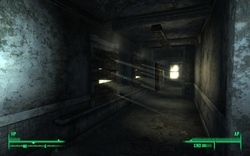Rampant Coyote on Level Up Frequency
Rampant Coyote on Level Up Frequency
Editorial - posted by Infinitron on Sat 8 December 2012, 23:33:26
Tags: Jay Barnson; Rampant GamesJay "Rampant Coyote" Barnson, developer of Frayed Knights (vote for it on Steam Greenlight!), has put up a blog post in which he muses about trends in level up frequency. It's fairly short, so I'll just quote the entire thing.
Back in the (somewhat) earlier dice & paper RPG days, one of the key differences between skill-based RPG systems and class/level based systems (which have now married and have had lots of hybrid babies) was the pace of character progression. In a skill-based system, you typically gained abilities, or points to spend on abilities, after every session / adventure. In the case of point-buy systems, you could often spend the points immediately on small gains, or save them up for more impressive abilities.
Class / Level based systems – of which Dungeons & Dragons was the role-model – were generally slower, with intermediate gains usually in the form of improved equipment. But then you got all of your gains as one package of bonuses, which felt great. In skill-based systems, the incremental improvements were not as noticeable, but suddenly being able to cast 3rd level spells in D&D was huge – on top of extra hit points, better chances of hitting, better saving throws, and more spells overall. Instead of a constant slope, you had a staircase, where each step felt like a significant increase. Unless you were playing a fighter, I guess…
But in earlier editions of D&D, those levels (if the DM was playing by the rules *) came pretty quickly early on, but came progressively slower. It was not uncommon to hit 2nd level after a single adventure, but going from 7th to 8th level might take months of weekly sessions. One might argue that this was really too slow and would make characters feel stale and drag the game, and that would not be entirely incorrect. However, up through the 1st edition of Advanced D&D there was something of a “soft cap” around 9th level (closer to 6th level in the original), after which non-spellcasting class progression became really kind of meaningless. So around 7th or 8th level you were really entering the “end game” area, and at that point progression really became more about acquisition of equipment (and sometimes followers, and eventually even castles).
A few CRPGs (particularly those most closely adhering to D&D style rules, whether informally or via license) followed this slower progression rate. The Ultima games started with unbounded, frequent level gains, and then capped them at lower progression for the middle saga. The later games went more towards the skill-based progression.
One interesting approach (IMO) was Dungeons & Dragons Online, which by license used a system based on 3rd edition D&D, but due to the limited level ranges really slowed down progression. In exchange, they offered small advancements in the form of ranks between levels – a more skill-based form of minor improvements.
But most CRPGs nowadays tend to keep progression at a pretty steady, rapid pace, slowing gradually. For MMOs, I’m sure teams have it down to a mathematical abstraction of something like a level per 20 hours of average, active play or something along those lines. For action-RPGs, it seems like it averages closer to a level every hour or two. My own game, Frayed Knights: The Skull of S’makh-Daon, slowed things down a little bit with only around 10 levels of progression for an approximately 30 hour game.
Obviously, there’s no magic number for an “optimal” progression rate. There are way too many variables. The player should be having a good time throughout the game, and whether that’s because of treasure hunting, achieving new levels, having a blast running through levels or being riveted to the plot – or any / all of the above, is immaterial. But it does seem that there’s an expectation of a more rapid pace of leveling in modern CRPGs than there was in previous eras. Then again, people generally have less patience for the length of the older games, but I hesitate to make that any kind of blanket statement considering the length of some of my modern favorites.
Does slower character progression frustrate you, as a player? Or is that merely a symptom of a game being too slow as a whole? On the flip side, do you ever feel progression is too fast, and you don’t have the ability to fully understand or master your character’s new abilities before the next ones come in?
There are 12 comments on Rampant Coyote on Level Up Frequency














